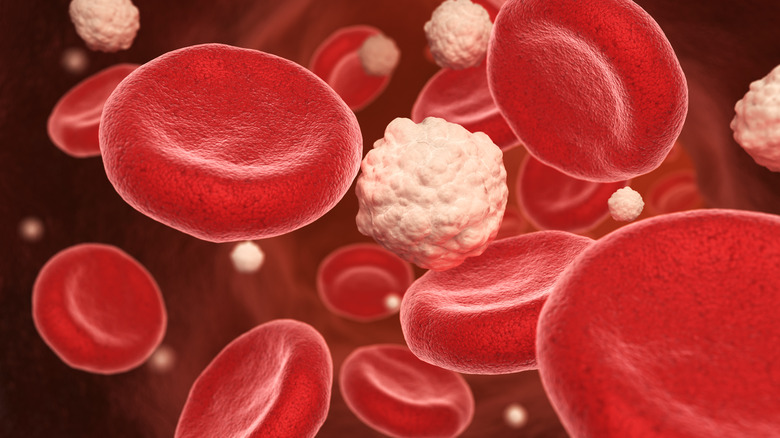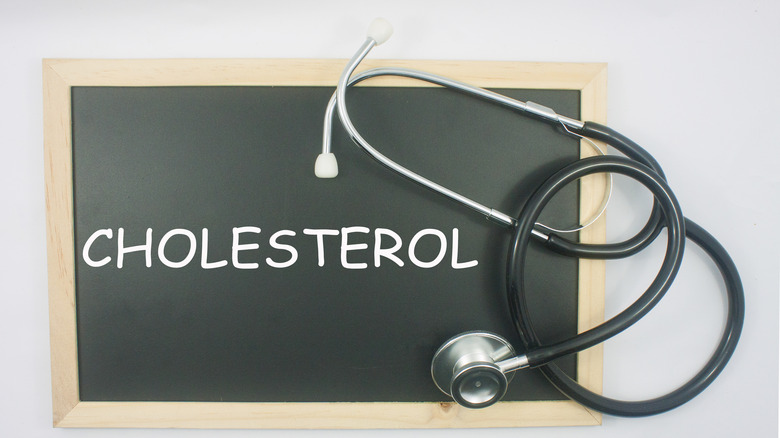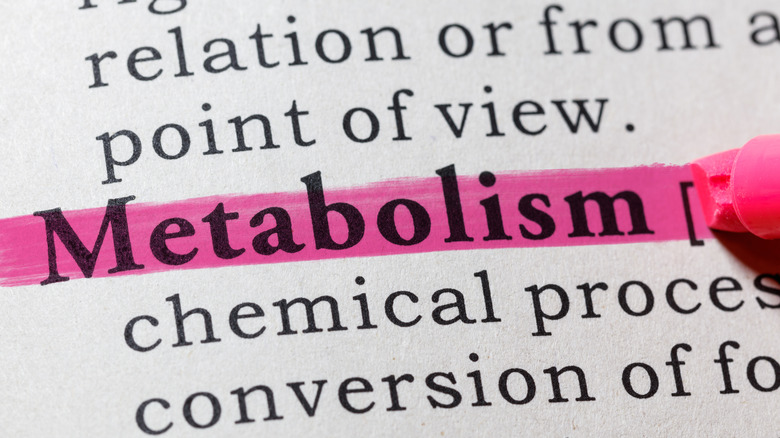What Happens If You Don't Eat For A Whole Day
As we settle into a new year, many "resolutioners" set out to accomplish goals they've set for themselves for the next 12 months ahead. Among the most popular of these resolutions is modifying their eating habits. Many tend to gravitate towards intermittent fasting — where one intentionally omits food for a certain period of time. Standard fasts can last anywhere from 8-16 hours. However, more and more people have gravitated towards a full 24-hour fast. Below, we'll be taking a look at what exactly happens to our bodies when we fast for 24 hours.
It's firstly most important to note that before modifying your nutritional intake or cutting back on any foods, one should seek out guidance from your primary care doctor, as a dramatic cut-back can lead to detrimental health consequences. Regardless of why one would seek to fast for 24 hours, it's also important to note that water intake is imperative during a fast. Bring your appetite for knowledge along as we explore what happens in a 24-hour period of no food.
Your body will begin to break down glycogen
YouTube channel ASAPScience provides an easy-to-follow demonstration of what happens to your body when you stop eating. Within the first six hours of fasting, your body starts to break down glycogen into glucose for your cells to access energy to keep you moving.
You may be reading this and feeling a bit confused about what this all means. We'll "break it down" for you: Glycogen is the stored form of glucose. Glucose is the body's main source of energy, which mostly comes from carbs. Endurance athletes tend to "carbo load" before their big event to store as much glucose in their body as possible to store as glycogen. The body tends to hold on to this energy until it receives a signal from the brain that energy is needed. When that signal is reached, the body will tap into that stored glycogen and start breaking it down into glucose for energy (via Cleveland Clinic).
You may get hangry
If you haven't experienced the unpleasant feeling of being "hangry," you've more than likely witnessed a friend or loved one in the pangs of its woes. Hangry – a joined term of "hungry" and "angry" occurs when you haven't eaten for a while, and your body recognizes that. As a result, you may experience irritability, sadness, tension, and even low self-esteem. There's a science as to why hunger affects our mood, and researchers have studied the brain to better understand why this moody feeling happens.
A hormone called "ghrelin" is released when your stomach is empty. This hormone sends a message to your brain to indicate that it's time to eat. This hormone also affects brain functions such as thought process, impulse control, and impaired memory, and disturbs healthy well-established pathways (Via GoodRx). Additionally, due to low blood sugar levels, your body releases the stress hormone cortisol, which may alert one's "fight or flight" response.
Your body will enter ketosis
At about the same time you experience being "hangry," your body is going into overdrive to find energy. When your liver breaks down fats, it produces a chemical called ketone. You may have heard of the trend "keto diet." This is when one restricts their intake of specific foods such as carbs. The absence of these particular foods signals the brain to start breaking down the stored fats in your body. This process is called ketosis. You may recall that the body typically uses glucose for energy. When you're in ketosis, the body uses your own fat for this energy once the glucose runs out (via Healthline).
After just a few hours of not eating and depleting your glycogen stores, your body will enter ketosis as it rallies to find energy for you. YouTube channel ASAPScience provides a simple animated explanation of this process. It's important to note that even in ketosis, the brain will still struggle to operate at its optimum capacity.
You may experience anxiety
Research conducted in a 2018 study found that even just skipping breakfast can produce unwelcome feelings in us, particularly adolescents. While the study concluded that those who skip breakfast are less likely to experience unpleasant emotions than those who ate a poor-quality breakfast, the results yield that skipping breakfast has more negative effects than if you were to eat. The study determined that those who skip breakfast are more likely to lead an unhealthy lifestyle than those who do eat breakfast. The study additionally notes that skipping the first meal of the day is linked to low-quality habits later in life, such as alcohol use, smoking, and gravitation towards a sedentary lifestyle.
Today points out that by skipping meals, one is more than likely to be prone to anxiety as blood sugar levels drop. This prolonged effect tends to hurt one's irritability as well. Furthermore, it's noted that skipping meals can also result in light-headedness, dizziness, weakness, and confusion.
Your energy may decrease
By now, we've learned that not eating can offset several negative things that will undoubtedly impact your day-to-day life. Many people are known to live an on-the-go lifestyle, and one of the most important things we need to carry out that lifestyle is energy.
When we don't eat for a specific amount of time, our bodies are fighting against the clock to make sure that it's using all of their resources to find energy for us since we're not getting it from food. As a result of not eating, it's common for someone to experience a sharp decrease in energy. Medical News Today notes that physical tiredness may occur when we're not adequately fueling our body for the body to function. Suddenly, the simplest tasks may seem like a burden, and those with a physically active lifestyle will more than likely see a decrease in their training performance.
Your brain signals may get out of alignment
From your emotions to your thought process, not eating will mess with the natural baseline that your body has for you. Many aspects of body and brain functionality are suddenly out of alignment when we stop nourishing it with the foods we need to survive. Among the many things that will go out of alignment from not eating are our hormones; as mentioned above, ghrelin is the hunger hormone that signals our brain that it's time to eat. Another hormone also comes into play here, which is called leptin (via Cleveland Clinic).
Leptin is the hormone that signals satiety in us. When you are eating and you start to feel like it's time to stop, leptin is doing its work in the background. When we throw out body's natural rhythm out of place by not eating, these hormones are more than likely to get confused. According to National Eating Disorders, depriving ourselves of food will confuse our leptin levels once we finally eat, making it difficult to realize if we're full. This is typically why crash diets don't work, as your leptin levels are too low to indicate fullness, and as a result, many gain their weight right back from overeating.
It may assist in weight loss
For those looking to lose some weight, it can be very easy to fall prey to diet fads and trends. There's a reason why many dieters tend to gain their weight back and then some after their diet is complete. Among the more prominent reasons is their diet isn't something they can attain long-term. However, one method seems to be a tried-and-true practice, as it's presented more as a lifestyle habit. That method is intermittent fasting.
By not eating for a day, we are participating in intermittent fasting. Dr. Steve Mount of the University of Maryland shares with Global News what happens to him when he doesn't eat for 24 hours — a practice he has been doing for certain days of each week for years: "It did improve my stability, my ability to remain focused throughout the day, my insulin response." Dr. Krista Varady shares her insights with Global News, stating, "People are gaining a lot more confidence in it because the science is behind it. It's working and it's not harming people in any way. Clinicians are way more positive about it."
It's always best to check with your doctor to see if you are a good candidate for intermittent fasting, as it is not for everyone.
It may improve cardiovascular health
So far, we've covered a good amount of negativity that tends to occur when we don't eat for a certain period, specifically for 24 hours. The good news, it's not all terrible! Fasting has scientifically proven to yield positive results as well.
According to a 2018 study, fasting for a period of time has been proven to lower one's risk of diabetes and coronary artery disease and improve one's metabolic rate. Additionally, in this study, results yielded that the participants showed lower levels of TMAO (Trimethylamine-N-oxide), a toxic compound made from human gut bacteria (via Food Revolution Network). This production is set off by eating certain types of foods, and the presence of this compound is often affiliated with inflammation. Additionally, the presence of this gut bacteria is a factor physicians tend to use as a medical indicator to assist in predicting strokes, heart attacks, and even death (via Cleveland Heart Lab).
Your body can detox from cholesterol
Many things happen in our bodies behind the scenes when we don't eat for an entire day. With no food in us, it's a wonder how our body operates several internal processes. While the ketosis process continues, the body can incorporate a little "spring cleaning." While in ketosis, the body can begin detoxing itself from cholesterol and uric acid, releasing these two components into the bloodstream.
During this process, one may experience various adverse side effects such as headaches, dizziness, exhaustion, or muscle and joint pains (via Better Me). When the body is nearing the end of this purge, these not-so-welcomed side effects may begin to lessen, and blood pressure can then start to drop. According to Healthline, this small but powerful purge of cholesterol may help reduce the risk of developing life-threatening conditions in the future, such as diabetes and cardiovascular diseases.
Your metabolism might slow down
While several studies have indicated that fasting for a certain period of time may assist with increasing the metabolism, there are just as many studies that have concluded the complete opposite. It's important to note that genetics play a big role in your metabolism, which is why fasting results may vary.
According to Healthline, eating too few or no calories at all may be slowing down your metabolism. One of the many reasons it's highly recommended to speak with a doctor before attempting to lose weight is that one may be informed that dropping too low too soon may have the opposite intended effect. Your body may then detect that food is suddenly scarce, and therefore it may enter "starvation mode," which is when it holds on to calories to preserve what it already has. Piedmont clinical dietitian Haley Robinson notes, "When you skip a meal or go a long time without eating, your body goes into survival mode."










